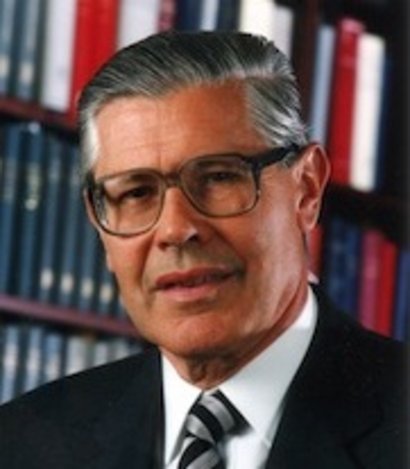Professor Dr. iur. Dr. h.c. mult. Klaus Stern †
(Head of the Institute 1966 – 1998)

Political advisor and founder of the standard comment on governmental organization
Klaus Stern, born in Nuremberg on January 11, 1932, graduated from the humanistic Melanchthon-Gymnasium in Nuremberg in 1951. From 1951 to 1995, he studied law and economics in Erlangen and Munich. In 1955, he passed the First State Law Examination in Munich, where he received his doctorate in 1956 with a thesis on the "Interpretation of Laws and Principles of Interpretation of the Federal Constitutional Court. He then served as a legal trainee in Munich from 1956 to 1960 and as a research assistant at the University of Munich. In 1960 he passed the second state law examination.
In 1961, he qualified as a professor of public law and general jurisprudence with the topic "Economic Constitution and Energy Law". In 1962, he was appointed full professor of constitutional law and politics at the Free University of Berlin, and in 1966, after rejecting several calls to other universities, he took over the chair of public law, administration and general jurisprudence at the University of Cologne, succeeding Hans Peters.
He became director of the Institute for Public Law and Administrative Theory, which he headed until his retirement in 1998. In 1968, he was also appointed director of the Institute for Broadcasting Law at the University of Cologne, which he continues to head. In 1969, Klaus Stern was elected Dean of the Faculty of Law by his faculty and, at the age of 39, Rector of the University of Cologne by the Grand Senate for two terms from 1971-73. From 1973-75, he served as prorector. In the period 1971-72 he was chairman of the State Rectors' Conference of North Rhine-Westphalia.
From 1976-2000, he was a judge of the Constitutional Court of the State of North Rhine-Westphalia as a member elected by the state parliament. He is still active today as Director of Studies at the Düsseldorf Academy of Administration and Economics. Klaus Stern was appointed to several federal and state institutions as well as scientific organizations. He was, among other things. Member of the Permanent Deputation of the German Jurists' Conference (1972-84), of the Enquête Commission on Constitutional Reform of the German Bundestag (1971-76), First Chairman of the Association of German Teachers of Constitutional Law (1978-80), Member of the Senate of the German Research Foundation (1983-89), of the Party Financing Commission of the Federal President (1992-93), of the Scientific Advisory Council of the Federal Ministry of Finance (since 1975), of the North Rhine-Westphalian Academy of Sciences (since 1978), and most recently member of the commission appointed by the State Parliament of North Rhine-Westphalia on questions of parliamentary law (2001-02). Klaus Stern was called in several times as an advisor to the negotiations on the reunification of Germany. In July 1991, he moderated a forum in Bonn initiated by the then Federal Minister of Justice, Klaus Kinkel, to deal with the injustices of the SED.
Klaus Stern was awarded, among others, the Grand Decoration of Honor in Gold for services to the Republic of Austria and in 1989 the Grand Cross of Merit of the Federal Republic of Germany. In addition, the Federal President of the Republic of Austria awarded him the Austrian Cross of Honor for Science and Art 1st Class. In 2000, he received the Order of Merit from the State of North Rhine-Westphalia. The city of Düsseldorf honored him with its Medal of Merit in 2002. The universities of Wroclaw/Poland (1987), Fortalezza/Brazil (1991) and Verona/Italy (2005) awarded him honorary doctorates. Klaus Stern's main areas of work are in the fields of German and foreign constitutional and state law, European law, administrative law, in particular municipal and economic administrative law, media law and postal law. Since 2006, Klaus Stern has been an honorary member of the Japanese Academy of Sciences. Klaus Stern is the founder and author of one of the most comprehensive expositions of German constitutional, political and historical law. The five-volume work with approximately 12,500 pages has become a standard work since the publication of the first volume in 1977. He passed on January 5, 2023.